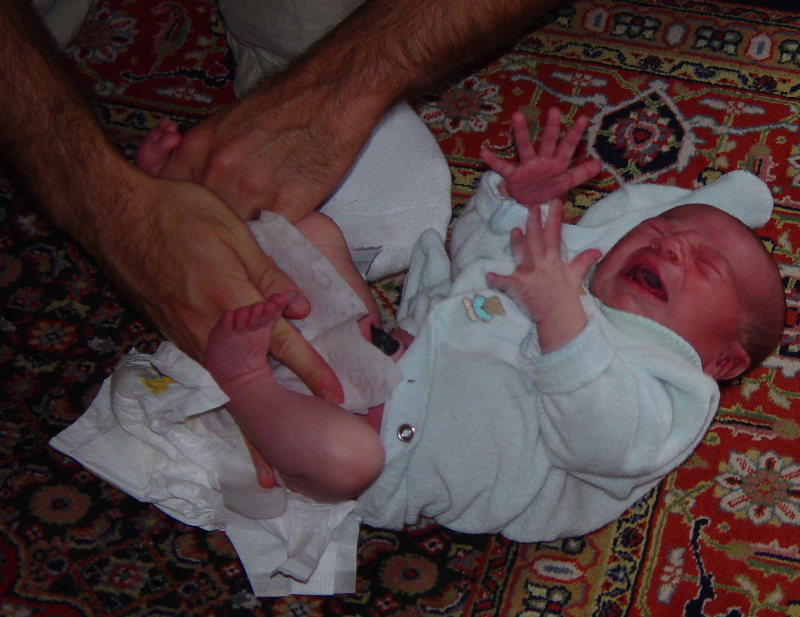One of our doctoral students, Ms. Mako Miura, recently challenged me with a question I had never entertained. We were discussing Jean Lave’s model for learning through participation (1991). We were focusing on some of the examples Lave mentions that point to the asymmetry between those in the “peripheral” position and those in the “full” position. Prototypically, we have an apprentice, initially ignorant but granted the legitimacy to participate, and the master who granted this legitimacy and eventually gets the apprentice to “learn” through participation that which characterizes a particular “shop floor” (to index Garfinkel). I emphasized that Lave is building a “model” to help us through initial analyses of the “educational” (“instructional,” “learning”) aspects of the organization of any floor. And I proposed we approached the encounter between first time parents and their child as just such a floor where a very legitimate participant will be learning everything that already makes this particular “family” (to keep it simple): familial configuration, ethnic or regional particularities, language, “culture.”
As this point, Miura asked: “could we argue that, on this floor, it is the child who is at the center and the parents who are on the periphery as they will have to ‘learn’ parenting?”
I must say that, whenever I have taught Lave (& Wenger)’s book, I have never pondered whether we should also consider the possibility of a feedback learning whereas the apparently “full” person discovers what apprentices are like, how they are learning, and what these apprentices are doing with that. I do not think that Jean Lave (or Ray McDermott with whom I once participated with her in a joint seminar on “ignorance”) ever considered such a possibility. And yet, particularly if we approach the issue after reading Rancière’s Ignorant Schoolmaster ([1987] 1999), as we did in the class, then the question is one we should take seriously.
The issue is a classic one in cultural anthropology, particularly in the Boasian traditions led by M. Mead and many others who build on what appears to be a common sense generalizations. Here is the way Geertz once put it:
One of the most significant facts about us is that we all begin with the natural equipment to live a thousand kinds of life but end up in the end having only lived one.” (1973, 45)
In other words related to ignorance and knowledge, one starts knowing nothing (but able to learn anything) and immediately gets taught in the language, styles, religion, etc., of one’s population, thereby limiting further and further what one can do with the rest of one’s life. Cultural anthropology is, also, about the ongoing restriction on possibilities (and the powerful ones re-enforcing these restrictions).
I suspect any introductory class in cultural anthropology (and all related discipline) starts with a version of this and will include discussion of enculturation, socialization, the development of an identity, etc.
This is probably where I would start, if I had to teach such a class.

But, things are not so simple when one considers the “shop floor” where a child and their parents first stare at each other wondering what to do next. The parents may be quite articulate about their wonders. They probably deliberate extensively with each other and with all the significant others with whom they are currently living or who directly impinge on their lives (parents, peers, the media, pediatricians). The infant may not be able to do much more than smile or cry but anyone who has been with a child, however young, has experienced the ongoing investigations that the child is doing (via , first, eyes, arm movements and such, and, soon, through various forms of vocalizations that turn into words). The child, we must assume, is not just “absorbing.” The child is also analyzing, exploring, testing, etc., and doing it more and more articulately as time passes (consider the 3 year-old who keeps asking ‘why?’). I am not proposing anything here about the child’s “consciousness.” I am just suggesting that we should never assume what a lack of linguistic articulation might imply in relation to analysis, exploration, testing, etc.
One thing that is certain is that, along with anything else the child may be doing, they are arguably, imposing their will to live on bumbling parents and thereby teaching them (plural) how to deal with them (singular) while being totally ignorant of what it is that they are teaching.
The infant would thereby be the ultimate “ignorant schoolmaster”…
Food for thought for future anthropologists who will conduct research on early child development, the production of particular family styles, and such.
[this is also a message to you (EB, GR, MN) to push dis- (vision, hearing, mental) studies to take very seriously what is otherwise a pious cliche “teachers learn from their students” (as it certainly applies to me): what exactly is it that a blind/deaf/confusing/… person teach the most significant persons in their entourage (assemblage) through ongoing everyday interaction in routine activities? How do they do it and with what stuff? (The prototype that should guide any research in this line is Goodwin’s work on communication with a person with aphasia (2004))]
References
Geertz, Clifford 1973 The Interpretation of Cultures. New York: Basic Books.
Goodwin, Charles 2004 “A Competent Speaker Who Can’t Speak: The Social Life of Aphasia.” Journal of Linguistic Anthropology 14, 2:151-170.
Lave, Jean and E. Wenger 1991 Situated learning: Legitimate peripheral participation. New York: Cambridge University Press.
Rancière, Jacques [1987] 1999 The ignorant schoolmaster: Five lessons in intellectual emancipation.. Tr. by K. Ross. Stanford, CA: Stanford University Press.
 Print This Post
Print This Post